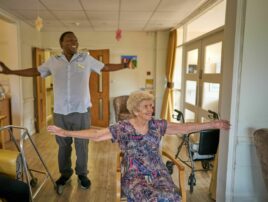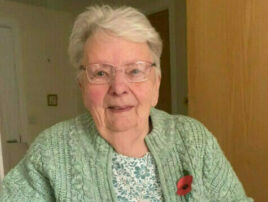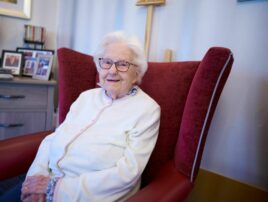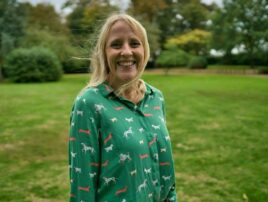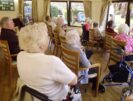Thursday 13th November 2025
Meet Wellbeing and Dementia Lead...Mark
Tyler Sewell-Nicholas
Mark has worked at Emmaus House, Harrogate for three years as our Wellbeing and Dementia Lead, championing our person-centred approach. As he prepares to retire, he reflects on all he has learned

I never intended to end up in care work, but two and a half years in, I can honestly say this job feels like home. I was born into a Christian family and at the age of eight decided to follow Jesus, and that choice has shaped everything I’ve done since. I left school at 16, took an apprenticeship with BT, and over 25 years grew into senior management, working on big programmes and systems. Later, I ran a small business for a few years. Then my church asked me to join their staff. For 12 years I served in church leadership, seven of those as senior pastors. Six years ago, God led my wife and I to Harrogate in a way I still marvel at.
I joined Emmaus House as Wellbeing and Dementia Lead, where I felt called to serve. When my wife and I arrived in Harrogate, we had few roots or connections outside church, so I was looking for a way to belong. I saw this job advertised, showed it to my wife, and she said, “That role has your name written all over it.” I wrestled with doubt before the interview, but while decorating the house one day I asked God, “Is this from You?” The phrase came: “I don’t give you a scorpion; I give you an egg.” It was all the reassurance that I needed to apply for the role.
My experience of dementia care was personal before it was professional. My dad spent five years in a nursing home, and my mum lived with dementia for about 10 under 10 years—five at home, then five in care homes. Some of the things I see now, I wish I’d known then. Each person is different, as is their dementia journey: Alzheimer’s, Lewy body, vascular, mixed etc. Understanding the unpredictability, the sensory distortions, the frustrations suffered by those with this disease, has shown me the need to care with humility, not assumptions.
From day one I committed to a simple principle: we do with, not do to. Care must always be person-centred, never task-driven alone. Every moment is an opportunity to connect. When we make someone a cup of tea, it becomes a moment to have tea with them. When we help someone brush their hair, we ask, “would you like help with your hair?” let them do what they can, and if needed help them finish off. What someone refuses today, they might accept tomorrow. A lady once told me she missed coffee, even though everyone said she only ever drank tea. Small reminders like that keep us humble, curious, flexible, ever listening.
I start around eight, to see who’s around and how they’re doing. Sometimes I notice staff members quieter than usual. Then I pause and ask, “What’s going on today?” I seek to find a quiet moment for a personal chat, to hear how they’re doing. Staff sometimes bear hurts, grief, and stress. My pastoral training helps me listen, pray, encourage. Some conversations happen over tea, some in office corners, sometimes outside work when extra support is needed. It’s never a script; just heart meeting heart.
A “typical” day doesn’t exist. I must be interruptible because often the interruptions are the ministry. One evening, on my way home, I found a ‘family member’, (those who live with us) frozen on the stairs, unable to move up or down, panicking. I stayed with her, step by step, over a period of time, and was able to help her to the dining room for tea. When new family members arrive, I sit with them, listening to their life story, loves, fears, what dementia means, what are their hopes. Other times I’m observing care, giving feedback, helping staff live The Way We Care approach in ways they might not even notice.
Faith is the lens through which I do this work. I believe love is “the will to good”. In every interaction, whether with a family member, a staff member, or a relative, I ask, “Is this rooted in the will for their flourishing?” Sometimes the moment is tense; a family or staff member is upset. That’s okay. The motive for action must be love, not control. Kindness, patience, gentleness—these are the fruits of the Spirit I lean into when tiredness presses in. When someone with dementia asks to go to the toilet repeatedly, love doesn’t snap.
Relatives are part of the journey for caring for family members. I listen to their frustrations, fears, and misconceptions. Family Matters meetings open doors for them to ask, learn, and share. I invite them into our café sessions, let them sit with their loved ones, and help them see new ways to connect. I try never to miss greeting a relative at the door: “How was Dad today?” “Not so good.” Those brief conversations sometimes stretch to 30 or 40 minutes, but they matter. I try to walk with them, acknowledging their hurt, helping them see this is not personal; it’s the disease. I’ve seen tension dissolve and hearts soften simply by them being heard and understood.

What keeps me going are the small victories. These include the family member who begins to feed herself again, the carer who rediscovers joy in their calling, the relative who suddenly says, “I see now.” Those moments, though sometimes fleeting, are seeds of hope. At the end of the day, this work is not ultimately about tasks or routines; it’s about presence. It’s about doing with, not to. It’s about reflecting Christ’s love in small, faithful acts.
If I could sum it up: this role is not just what I do. It is who I am becoming.
After Mark retires this November, he will remain a familiar face at the home as a volunteer.
More from Pilgrims' Friend Society...

The Way We Care
Our unique approach to ensuring that older people have all that they need to flourish in their later years

Meet a carer...Nadia
Nadia, 22, joined Emmaus House in 2021. She was recently named Harrogate College’s 'Apprentice of the Year'

Making waves in care
Emmaus House Harrogate, enjoyed a joyful, accessible boat trip in Skipton, filled with nature, laughter, and connection

